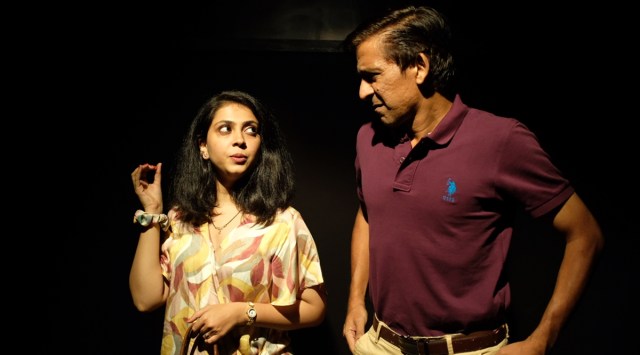Kids alright, adults have problems in Anupam Barve’s hit Marathi play Ucchhad
The cast — Sayalee Phatak, Tanvi Kulkarni, Siddhesh Dhuri, Niranjan Pedanekar — play the two couples who are meeting to discuss a fight between their children in a playground.
 The play has been critically and commercially successful, and will have its 25th show at The Box Pune on Saturday. (Express Photo)
The play has been critically and commercially successful, and will have its 25th show at The Box Pune on Saturday. (Express Photo) With seating very close on both sides of the performance space, the Marathi play ‘Ucchhad’ turns audiences into voyeurs in a story about violence. It is based on ‘God of Carnage’, a script by French playwright Yasmina Reza, which has stimulated directors and actors across the world. The new production by Pune-based Rakhadi Studio, with director Anupam Barve, adds to the canon.
The play has been critically and commercially successful and will have its 25th show at The Box, Pune, on May 28 (5 pm).
“The intention is to give the feel of a cauldron or an arena where people are all around the players. It is almost as if the audience is peeping into someone’s house. Though realistic, the sets are minimal, allowing for a space between naturalism and the abstract. Although the play unfolds in real time, one can get a sense of time compression, where too much seems to have taken place within the said time frame,” according to Barve.
The cast — Sayalee Phatak, Tanvi Kulkarni, Siddhesh Dhuri, Niranjan Pedanekar — play the two couples who are meeting to discuss a fight between their children in a playground.
As the conversations progresses, however, it is the adults whose attitudes become increasingly stressed and violent. Pedanekar, who has adapted the script, had been warned that “the playwright’s agent would not give rights to translations that didn’t preserve the names and cultural references from the original French”. To bring ‘God of Carnage’ alive in Marathi, he began to preserve the dialogue structure and progression, while changing cultural references to urban Indian ones.
The performers are aware that the play is being presented in a world where conflict has become rampant — with regular new cases of personal or political
violence.
“On social media, for instance, normal, civilised people become part of warring factions with different ideologies and erupt at the slightest provocation. Another form of violence is prejudice and judgment, which the characters in the play engage in a lot. It means cutting down an entire way of thinking and not giving a chance to a dialogue. One woman character houses her own prejudices, while still wanting to set things right and restore order. She is confronted by long-harboured prejudices and savage judgements, closing all avenues to a meaningful and peaceful dialogue,” says Pedanekar.
“Will the play bring about a change in people? Most likely not. But it will show a mirror to the society, and our little prejudices and judgments, which we sometimes refer to as ideologies?” he asks.


































